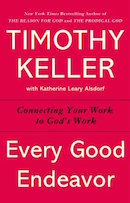Leadership Influence: Beyond the Stereotype
Blog / Produced by The High Calling
The word leader comes from an ancient Indo-European word, leit, which means “to go forth and die.” It was the title of the guy assigned the job of carrying the flag in front of the army. With the leit’s sacrifice of his life, the rest of the army knew that the enemy had attacked. It was time to engage.
Does that sound like leadership to you?
When most of us think of “leadership” or “influence,” we often get the image of an authoritative person, self-confidently telling people what they ought to do. This person is the expert. This person has the power. This person solves the problems and fixes the issues.
Sometimes the leader has charisma; sometimes the leader just has power because they can fire somebody.
What is a leader?
Is a leader someone who has all the answers? Is it someone with authority? Or, is it someone who makes the sacrifices necessary to empower and encourage others to engage and to work together toward common goals and solutions?
Some of us have experienced people who think of themselves as leaders, who have an arrogant swagger, a desire for power, a smug know-it-all attitude. And we naturally find such an image unseemly.
This is not the image of Jesus, the most influential person who ever walked the planet.
Jesus the leader
Jesus Christ had every right to exercise his authority, and at times he did (as when he cast out demons or healed people). But, in the bigger picture, he did not “lord it over” people. He sought to be influential rather than brandishing his power.
This might seem contrary to what we hear in Sunday School, but Jesus’ goal was not to do all the work of restoring everything for us. Jesus’s work of atonement on the cross decisively accomplished redemption. But that was not the end of the story; it continues on as we, the body of Christ, live sacrificially in order to see God’s redemption impact every aspect of life on earth.
Jesus did not promise that once he died and was raised from the dead that we could relax because the work was all done. No, he actually made people uncomfortable and pushed them out of their comfort zones so that they would be the instruments of change in the world. Amazingly, Jesus takes people who are part of the problem and asks them to be a part of the solution.
Leadership: authority or influence?
That is why leadership is more than authority; it is influence. Leadership is about encouraging people, even people who are part of the problem.
As one of the foremost experts on leadership, Harvard’s Ronald Heifetz, told NPR,
“The people are the problem and the people are the solution. And leadership then is about mobilizing and engaging the people with the problem rather than trying to anesthetize them so you can go off and solve it on your own."
The notion that the leader is the go-to problem solver has got to be jettisoned. Leaders are leaders only when they serve people so that they can deal with issues and provide solutions collaboratively.
This is why “Servant Leadership” is so key. Why are leaders supposed to serve people? Isn’t it so that they can be encouraged and empowered to do their work well? Isn’t it to influence people so that whole organizations can better be in line with God’s good intentions for the world?
“[The Gospel] teaches that the meaning of life is to love God and love our neighbor, and that the operating principle is servanthood… To be a Christian in business, then, means much more than just being honest or not sleeping with your coworkers. It even means more than personal evangelism or holding a Bible study at the office. Rather, it means thinking out the implications of the gospel worldview and God’s purpose for your whole work life – and for the whole of the organization under your influence.” (quoted by RJS at Scot McKnight’s Jesus Creed blog).
Leaders encourage people to face and tackle reality
True leaders go beyond the stereotype of the know-it-all. They realize that the world can be a better place only as human beings are unleashed to creatively solve problems. True leaders realize that sin has so broken the world that simple solutions will never suffice.
In an article in Fast Company (“The Leader of the Future”), Ron Heifetz said,
“Mustering the courage to interrogate reality is a central function of a leader.”
How are we doing in helping people see reality? What are we doing to mobilize people to solve the very real issues that arise out of living in a fallen world? How are we influencing people to renew the culture and restore our communities?
Heifetz has it right when he says,
“Now, don't get the wrong idea. Leaders don't answer those questions themselves. That's the old definition of leadership: The leader has the answers — the vision — and everything else is a sales job to persuade people to sign up for it. Leaders certainly provide direction. But that often means posing well-structured questions, rather than offering definitive answers. Imagine the differences in behavior between leaders who operate with the idea that ‘leadership means influencing the organization to follow the leader's vision’ and those who operate with the idea that ‘leadership means influencing the organization to face its problems and to live into its opportunities.’ That second idea — mobilizing people to tackle tough challenges — is what defines the new job of the leader.”
_________________
Influential Leadership: Beyond the Stereotype
In this series at The High Calling, we featured three articles on how leadership goes beyond the stereotype of the self-confident all-knowing authority telling people what they ought to do.
In "The New Face of a Christian Marketplace Leader," Doug Cooper shares the stories of two young adults who are part of a growing group of Jesus-followers who are redefining Christian leadership. Allyse and Matt aren’t on upper rungs of organizational charts with a lot of authority, but they are indeed influential.
“This new generation of Christian marketplace leaders is quietly affecting influence simply by grasping a vision of the Kingdom that Jesus described and by doing their work in places and ways that help others in their communities experience the beauty and peace of that Kingdom.”
Brad Johnson tells the story of a humanities professor who modeled and encouraged collaborative leadership among her students in “Awakening Our Humanity.”
“In dealing gently with a sleeping student or relinquishing a well-earned title, Karen resisted the temptations to lecture, to proclaim, to command. In doing so, she reminded us that it is our humanity, not our teacher, which enables us— commands us—to be seekers of truth.”
David Rupert encourages us that, yes, “You Can Change the World.” Leaders are often afraid to take risks, to do that which is necessary to get people to move in a new direction outside the status quo.
“Leadership gets hung up on models and formulas for success. We read books and engage in five steps or three ways or seven habits. But until we influence others to act, we are just going through the motions. Leaders don’t have self-esteem problems. We don’t suffer from thoughts of inadequacy. Instead we fear that by exerting our influence we will make others feel insecure. So we hide our light under a bushel, retreating from our God-given ability. We melt into the landscape, camouflaging our talents.”
We also offered a couple Bible reflections on Leadership Influence by Peter Baker and encouraged folks from around The High Calling community to share their stories on Leadership Influence. Among these stories are: "A Generation of Esthers" by Becky Keife, "One Thing I Learned about Leadership" by Amanda Casanova, "The Leadership Influence of Mothers" by E. P. Hale, "Leadership That Matters" by Michelle Heinrichs, and "Leadership Vision" by Cheryl Smith.
_________________
Leadership Influence: Resources from Around the Web
Robert Greenleaf is recognized as the founder of the modern Servant leadership movement. Butler University published a very helpful, concise list from Greenleaf titled “Ten Principles of Servant Leadership.”
***
Larry C. Spears, a scholar in the field of servant leadership, provided Regent University a copy of his must-read, "Ten Characteristics of Effective, Caring Leaders."
***
Max DePree is one of the most respected business people of the past century. His Christian faith gives foundation to his leadership principles. In his classic book, Leadership is an Art, DePree writes,
“The first responsibility of a leader is to define reality. The last is to say thank you. In between the two, the leader must become a servant and a debtor. That sums up the progress of an artful leader.”
You can read a fuller excerpt from Leadership is an Art at LeadershipNow.
***
Speaking of DePree, the Max DePree Center for Leadership at Fuller Seminary now has an amazing online resource Fieldnotes Magazine, which every emerging leader should bookmark. In a recent post, Gideon Strauss meditated on the movie Mandela: Long Walk to Freedom. While stating that the movie portrayed Mandela as a flawed sinful man, there was something about Mandela’s leadership that was Christ-like: He was willing to lead at the cost of profound personal loss to himself.
“The best literature on leadership honestly address the responsibility of leaders to help those whom they lead to accept the losses that come with change for the sake of greater gains. Rarely, though, is it recognized just how much leaders themselves must be willing to lose to bring about the change to which they are committed. And judging by the life of someone like Nelson Mandela, the greater the change involved, the larger the scale on which the change is pursued, the higher the cost to the leader.”
***
Marc Cortez, in “When Servant Leadership Goes Wrong,” takes a more light-hearted movie to make a point about leadership, He asked a group of teenagers which of Marvel’s Avengers best modeled the biblical idea of a servant. Most picked Tony Stark, AKA Iron Man. Cortez does a great job pointing out that this character is not necessarily a good model of servanthood.
“In Stark’s version of servanthood, we serve from a position of power. Stark is the one with all the money, fame, and influence… Stark exemplifies service without servanthood. And that’s a tempting model for Christian leaders. Service lets us help out and feel good about ourselves; servanthood requires a complete transformation of our identity.”
***
Also, be sure to check out the City Gates Initiative, led by the author of one of the above High Calling articles, Doug Cooper. They offer several resources, from conferences to a wide array of various types of groups, so that leaders can collaborate to impact their cities for the common good.
_________________
Leadership Influence: Beyond the Stereotype
When we think of “leadership” or “influence,” we often get the image of a person of arrogant swagger, always self-confidently willing to tell people what they ought to do. And we naturally find such an image unseemly. This is not the image of Jesus, the most influential person who walked the planet. Neither is it the image of those we truly admire and can name were the most influential people in our own lives. In this series at The High Calling, Leadership Influence: Beyond the Stereotype, we feature stories of how people can be influential in ways that really matter.
Image by Peter. Used with permission. Sourced via Flickr.





